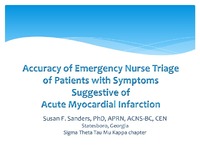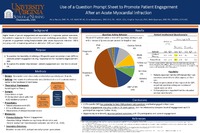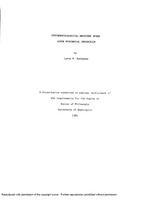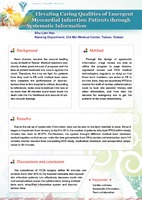| dc.contributor.author | Sanders, Susan F. | en |
| dc.date.accessioned | 2016-03-17T12:58:13Z | |
| dc.date.available | 2016-03-17T12:58:13Z | |
| dc.date.issued | 2016-03-17 | |
| dc.identifier | INRC15B17 | |
| dc.identifier.uri | http://hdl.handle.net/10755/601888 | |
| dc.description | <p>Research Congress 2015 Theme: Question Locally, Engage Regionally, Apply Globally. Held at the Puerto Rico Convention Center.</p> | en |
| dc.description.abstract | <p>Session presented on Friday, July 24, 2015:</p>
<p><strong>Purpose:</strong> More than 6 million people present to emergency departments (EDs) across the US annually, with a chief complaint of symptoms suggestive of acute myocardial infarction (AMI) (National Center for Health Statistics, 2008). Of the one million who are diagnosed with AMI, 350,000 die during the acute phase (IHI, 2009). Accurate triage in the ED can reduce mortality and morbidity, yet accuracy rates are low. The purpose of this study was to explore the relationship between patient characteristics, registered nurse (RN) characteristics, symptom presentation, and accuracy of ED RN triage level designations with symptoms suggestive of AMI. Constructs from Donabedian's Structure-Process-Outcome model (Donabedian, 1966; 1980) were used to guide this study.</p>
<p><strong>Methods:</strong> IRB approval was obtained from all institutions involved. Descriptive correlational analyses were performed using retrospective triage data from electronic medical records. Abstraction of data from the EMR was chosen as the method to capture data pertaining to time points of care in ED triage and care of patients with symptoms suggestive of AMI as well as patient demographics. A convenience sample of patient EMRs was used to obtain variables related to ED triage taken from a general acute care health system operating two separate EDs. Accuracy was determined based on whether or not a patient with symptoms suggestive of AMI was assigned a Level 2 triage designation.</p>
<p><strong>Results:</strong> A sample of 286 patients identified was primarily Caucasian, married, non-smokers, with a mean age of 61 and no prior history of heart disease. The sample of triage nurses primarily comprised Caucasian females of mean age of 45 years with an associate's degree in nursing and 11 years' experience in the ED. RNs in the study had an accuracy rate of 54% in triage of patients with symptoms suggestive of AMI. The older RN was more accurate in triage level designation. Accuracy in triage level designations was significantly related to patient race/ethnicity. Logistic regression results suggested that accuracy of triage level designation was twice as likely (OR 2.07) to be accurate when the patient was non-Caucasian. The patient with chest pain reported at triage was also twice as likely (OR 2.55) to have an accurate triage than the patient with other symptoms suggestive of AMI but no chest pain reported at triage. Neither RN experience in ED nursing nor nursing experience in general was a predictor of accuracy in triage of patients with symptoms suggestive of AMI.</p>
<p><strong>Conclusion:</strong> Atzema, Austin, Tu, and Schull (2010) defined RN experience as triaging a high volume of patients and suggested that high volume EDs were better at recognizing AMI patients and assigning the appropriate triage level designation. Quite possibly the opposite may be true. The repetitive nature of triaging the same type patient symptoms over and over may desensitize the nurse to the urgent need and actually result in inaccuracy by choosing an incorrect triage level. It is possible that the years of experience in nursing, and ED nursing especially, may color the judgment of the experienced RN such that more obvious patient deterioration during presentation at triage is deemed necessary for an RN to decide a true emergency exists and assign a Level 2 designation. This study adds to the body of evidence regarding ED triage of patients arriving by private vehicle with symptoms suggestive of AMI. However, inconsistency in nurse triage decisions may be due to other condition not yet explored, such as RN critical thinking skills, intelligence, and executive functions. A further investigation is warranted to assess factors affecting triage level designations. Further exploration into decisions at triage is warranted to improve accuracy, expedite care, improve outcomes, and decrease unnecessary deaths from AMI.</p> | en |
| dc.format | Text-based Document | en |
| dc.language.iso | en | en |
| dc.subject | Triage | en |
| dc.subject | Accuracy | en |
| dc.subject | Cardiac Emergencies | en |
| dc.title | Accuracy of emergency nurse triage of patients with symptoms suggestive of acute myocardial infarction | en |
| dc.title.alternative | Issues in the Management of Cardiovascular Disease | en |
| dc.type | Presentation | en |
| dc.rights.holder | <p>
All rights reserved by the author(s) and/or publisher(s) listed in this item record unless relinquished in whole or part by a rights notation or a Creative Commons License present in this item record.
</p><p>
All permission requests should be directed accordingly and not to the Sigma Repository.
</p><p>
All submitting authors or publishers have affirmed that when using material in their work where they do not own copyright, they have obtained permission of the copyright holder prior to submission and the rights holder has been acknowledged as necessary.
</p> | |
| dc.description.note | <p>Items submitted to a conference/event were evaluated/peer-reviewed at the time of abstract submission to the event. No other peer-review was provided prior to submission to the Henderson Repository.</p> | |
| dc.type.category | Full-text | en |
| dc.evidence.level | N/A | en |
| dc.research.approach | N/A | en |
| dc.contributor.department | Mu Kappa | en |
| dc.author.details | Susan F. Sanders, APRN, ACNS-BC, CEN | en |
| dc.conference.name | 26th international Nursing Research Congress | en |
| dc.conference.host | Sigma Theta Tau international | en |
| dc.conference.location | San Juan, Puerto Rico | en |
| dc.date.conferenceyear | 2015 | |
| dc.description.reviewtype | Abstract Review Only: Reviewed by Event Host | en |
| dc.description.acquisition | Proxy-submission | en |





